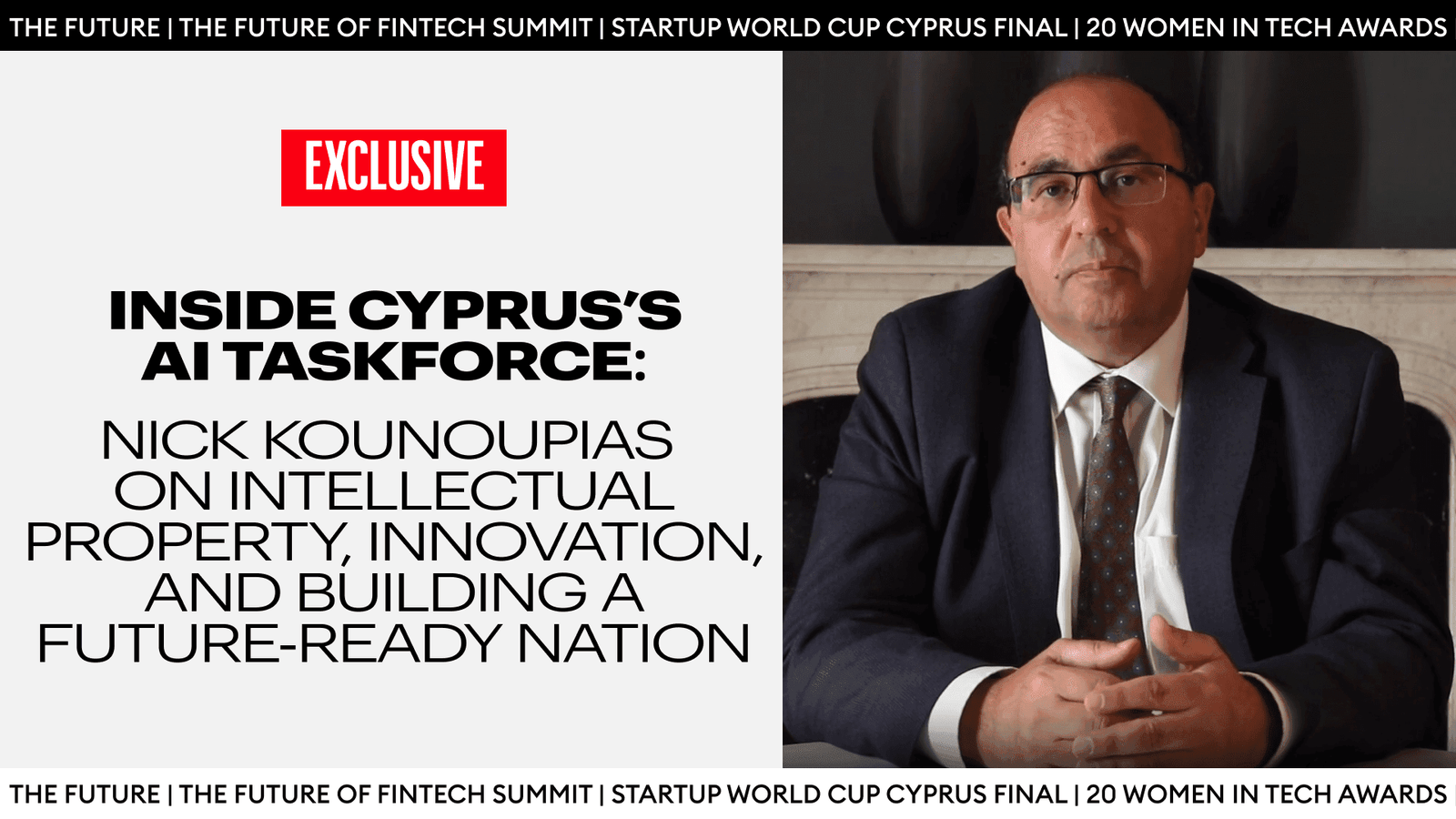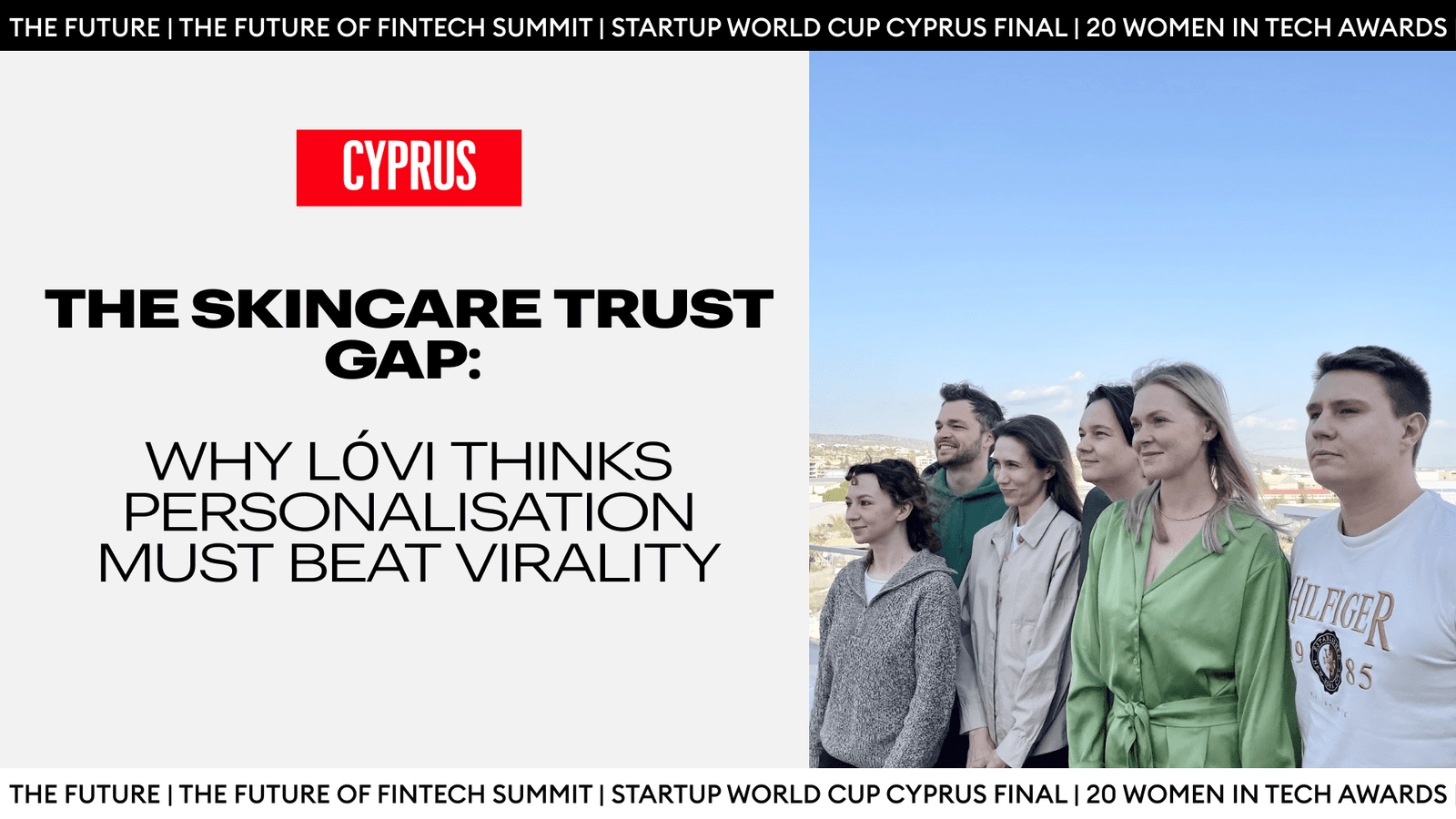As Cyprus shapes its national strategy around artificial intelligence, the newly formed National AI Taskforce brings together a diverse group of experts to chart the country’s path forward. Among them is Nick Kounoupias, a leading authority in intellectual property law with nearly four decades of experience across the UK, EU, and Cyprus.
As the Global Head of IP at IP Michael Kyprianou law firm, Kounoupias offers a critical lens: how legal frameworks, business ecosystems, and technological innovation must collaborate for Cyprus to become a successful AI hub.
Follow THE FUTURE on LinkedIn, Facebook, Instagram, X and Telegram
In this exclusive interview for The Future Media, Kounoupias discusses the urgent steps Cyprus must take to compete globally, the risks of falling behind, and why a strong legal and business foundation is the key to building a competitive AI ecosystem.
What perspectives or expertise do you bring to the Taskforce that you believe will shape Cyprus’s AI future?
I’ve been working in intellectual property since the mid-1980s (almost 40 years now) and have seen firsthand how legal systems struggle to keep up with technological change. I’m based about 75% in the UK and 25% in Cyprus, and I lead the IP department at Michael Kyprianou & Co., a major Cypriot law firm.
Over the years, I’ve been deeply involved with IP developments in Cyprus, often quietly, but consistently, and I’ve spent a lot of time trying to attract business and innovation to the island. I’m also the ambassador for IP at the UK-Cyprus Enterprise Council.
In your view, what qualities or achievements made you a strong candidate for this national role at such a transformational moment in AI development?
I bring something a little different to the Taskforce. Most of the members are scientists, brilliant minds in their fields. But science alone isn’t enough, you also need someone who can think logically, commercially, and legally about what’s realistic and achievable.
I’m comfortable expressing difficult or unpopular views when needed, which I think is important. I’ve also spent years shaping AI and IP policy conversations in the UK and working with American organizations. That experience helps me spot best practices (and mistakes) that Cyprus can learn from.
Above all, I think I bring a sense of urgency. AI is moving at a speed we’ve never seen before in technology. We can’t afford to move at the traditional Cyprus pace; five years from now, the landscape will be unrecognizable.
What AI-driven opportunities do you see as most transformative for Cyprus’s key sectors—tourism, energy, healthcare—and for society as a whole?
Healthcare is where I see AI making the biggest difference, and it’s already starting to happen. Diagnostic tools powered by AI are being used by top surgeons in Cyprus, and that’s only going to accelerate. There’s also a big opportunity to build Cyprus as a destination for health tourism. Given the state of healthcare systems elsewhere, like the UK, people are looking for fast, high-quality treatment abroad. We could expand on what we’re already doing and become a real leader in that space.
Energy is another area where AI can help, monitoring renewable energy sources like wind farms and solar panels, for example. But it’s not going to solve everything. If there’s no wind for days, for example, no amount of AI will fix that.
Tourism is a different story. AI might make things like hotel bookings, flight management, or finding a sunbed easier, but it won’t replace the human side of Cypriot hospitality, and that’s one of our biggest selling points. AI can support the sector, but it can’t replace what makes Cyprus special.
How can Cyprus align its AI development with global trends while overcoming challenges like a small market size to attract global investment and attention?
We need to stop thinking small and start thinking smart.
Countries like Estonia, Luxembourg, and even places like the Isle of Man have shown that small size isn’t a barrier if you create the right ecosystem. Cyprus has so many advantages: bilingual professionals, a hybrid common law and civil law system, access to EU markets, and a strong reputation among international businesses.
But we do face challenges. We don’t always believe in ourselves enough, and sometimes government departments work at cross purposes rather than together. Bureaucracy slows things down.
To attract serious investment, we need to build a joined-up strategy, cutting red tape, modernizing institutions, and making Cyprus a place where global companies feel confident setting up operations.
How can Cyprus attract and retain top AI talent to drive its innovation agenda?
First, we have to create an environment where talent wants to stay and where international talent wants to come. That means improving infrastructure, building tech parks, speeding up court systems, and offering clear support for startups and innovation.
More than anything, we need to recognize that our real natural resource is human intelligence. Oil and gas (if we have access to it) can run out, but research and innovation are limitless. If we prioritize education, research, and commercialization and show young people there’s a future for them here, we’ll hold onto our best minds and attract others.
What are the biggest risks associated with AI integration in Cyprus, and how can the Taskforce proactively address them?
The biggest risk is that we move too slowly. AI isn’t like previous technological changes. It’s moving at a pace no one has seen before. If we delay by two or three years, it might be too late.
There are other risks, too. Job displacement is a big one. AI will replace a lot of traditional jobs, and in a country where the unions are strong, that could lead to serious social unrest. We have to start educating people now, explaining what AI is, what it isn’t, and how it will change industries.
Infrastructure is another issue. You can only use AI if you have fast, reliable internet and modern systems, and that’s not the case everywhere in Cyprus yet. We need to make sure the whole country is ready, not just a few pockets.
What is the one thing you hope to achieve during your term on the Taskforce?
If I can help Cyprus build a strong, credible framework for protecting innovation, particularly through intellectual property laws, then I’ll consider my role a success. I’m also keen to bring some realism to the discussions. Scientists tend to think about what’s possible in theory; I’m focused on what’s achievable in practice.
We need clear, practical steps. If I can help the Taskforce stay grounded while aiming high, and make sure we avoid the mistakes I’ve seen in the UK and elsewhere, then I’ll have done my job.
What steps is the Taskforce taking to ensure that Cyprus’s AI strategy is resilient to international shifts in regulations and technology trends?
We’re still at an early stage. Our first meeting was really about introductions. But what’s clear is that momentum will be key. We need regular meetings, constant updates, and an openness to adjust our strategies as the global AI landscape evolves.
Being part of the EU is a huge advantage for Cyprus. It keeps us plugged into major developments like the EU AI Act, and it gives us access to funding and collaborative opportunities.
If you could implement one groundbreaking AI initiative in Cyprus today, what would it be and why?
I would overhaul the court system using AI and digital tools. Litigation in Cyprus is painfully slow, it took 25 years just to update our court rules to match reforms the UK introduced back in 1999.
Imagine a fully digitized court system where timetabling, document management, and case progression are all streamlined through AI. It would transform the legal environment, boost investor confidence, and set Cyprus apart as a modern, business-friendly jurisdiction. From there, we could expand digitalization to other ministries that are still operating like it’s the 20th century.
What advancements in AI do you think will most impact global industries in the next five years?
Healthcare is going to change dramatically. AI is already reshaping diagnostics and treatment. In the legal sector, AI tools will eventually match the advice that professionals like me can give today.
And beyond specific sectors, AI will transform the way businesses operate overall, including decision-making and customer service. But this change won’t be gentle or gradual. It’s happening faster than any previous industrial or technological revolution. That’s what makes it exciting and dangerous if you’re not prepared.
How do you see the European Union’s AI Act influencing the development and deployment of AI technologies across Europe and in Cyprus?
The EU AI Act was well-intentioned, but it’s already outdated. AI moves faster than regulators can keep up. One major concern is that it allows platforms to train AI systems using others’ intellectual property without real transparency or consent, which has led to protests and lawsuits around the world.
The EU often feels like being given the keys to a Ferrari but being told you can only drive it with the handbrake on. We have incredible tools, but aren’t always able to use them properly.
For Cyprus, staying aligned with the EU is critical. It gives us credibility and funding opportunities. But we also need a major public education effort because right now, for most people in Cyprus, AI is something abstract and distant. Until we bring the whole society along, we won’t be able to fully benefit from what the EU is trying to build.
What does success look like for Cyprus in AI by 2030?
Honestly, I think five-year or seven-year plans don’t make much sense with how fast AI is moving. We should be thinking in one-year cycles, adapting constantly.
That said, success would mean Cyprus becoming a recognized hub for AI commercialization within the EU, attracting startups, building a strong tech ecosystem, and creating real jobs in innovation.
We’ll need tech parks, better laws, faster courts, joined-up government action, and a focus on building the right infrastructure. One challenge we’ll have to work around is climate; big AI platforms need cool environments, and Cyprus is, frankly, a very hot country.
So maybe the companies are based here legally and strategically, but the heavy server infrastructure is elsewhere. That’s fine. What matters is that Cyprus becomes known as a place where innovation happens.














